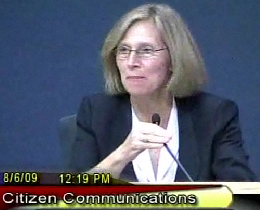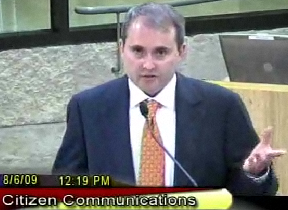 Paul read his letter to the Council:
Paul read his letter to the Council:"Hello, mayor and members of the council. I'm here today to talk about some limitations to the ECAD ordinance, and I passed out some printed material and backup to that and I'm just pretty much going to read what I have here. I find myself in a unique situation today and I need your help. My family members and I inherited an old house within the last year and now have a contract for sale pending. The house is in very poor condition. Travis County Appraisal District values the house at one dollar. And the insurance carrier has recently canceled the homeowners policy due to the condition. And those are exhibits 1 and 2 in the material that I passed out. Under the current energy conservation audit and disclosure ordinance, ECAD, we've required to get an energy audit prior to sale. According to the city's website, the estimated cost of an audit is from $200 to $300 for a typical single-family home, 1800 square feet or smaller with one air conditioning system, which fits this house. The ordinance has a very narrow variance provisions which require both the seller and buyer's cooperation. The buyers are unwilling to consent due to their own time frames. The buyers have a nine-page inspection report which thoroughly addresses the house's energy issues. Existing code compliance will take care of the energy concerns when they finally get around to their remodel. Although I don't have any position on the ordinance one way or the other, I'm all for the environment. I've been recycling for 40 years, am a charter board member and founding sponsor of Keep Austin Beautiful and a formed the ecology action board member. Initially when I contacted city staff, they figured that the director could grant a variance, grant a waiver. However, city attorney Andy Purney says there is no provision for any other variance other than the one that's in the ordinance, which is either for a remodel or a demolition. There's two versions of it, within a six-month period after the sale transacts. I suggest the ordinance is poor. I suggest you all figure out how I can avoid the requirement in this case. Spending $200 to $300 on a house valued at one dollar in the midst of a recession doesn't make any sense. I don't believe that's the intention of this ordinance. Thank you."
 Mayor Lee Leffingwell: Thank you, Mr. Norris. Councilmember Laura Morrison. Might be a question for you, Mr. Norris.
Mayor Lee Leffingwell: Thank you, Mr. Norris. Councilmember Laura Morrison. Might be a question for you, Mr. Norris.
Mayor Lee Leffingwell: We do.
Council Member Laura Morrison: That would be great. Could you talk a little bit about the waiver that goes into play if there's a demolition within six months in the future? How does that actually work?
Andy Perny: I am Andy Perny, Austin Energy legal services. He's correct, essentially there's two variance possibilities. There's actually a third related to undo hardship but that relates more to part of the ordinance that actually requires energy efficiency upgrades, not the audit portion. But essentially in order to qualify for the variance, both the buyer and seller would have to submit a variance application that they would agree to file the demolition permit within six months of the sale. That's just the plain wording of the ordinance.
Council Member Laura Morrison: I see. And that's not your situation here. Your buyer doesn't intend --
Paul Norris: The buyer is going to remodel it. There's two versions, the demolition and the remodel version. They are going to remodel it, but they are currently remodeling another property and are tied up on that project. There's an e-mail in here where their real estate agent is saying no, they are not going to enter into an agreement because of their own time frames.
Council Member Laura Morrison: and the remodel variance -- how does that actually work? It's required for that? Because it seems aparented someone is going to remodel it.

Andy Perny: I think there might be confusion because it was my understanding we were dealing with a demolition situation. The remodel situation is different. It doesn't contain a six-month gap. It simply states that the purchaser and seller have to agree to the remodel within a specified period of time.
Paul Norris: Well, when I had spoken to Steve Eanes and I clearly told him, he just got confused we originally --
Mayor Lee Leffingwell: Excuse me. This is not a colloquy here. We'll let the attorney speak and if there's another question for you.
Council Member Laura Morrison: Really maybe it sounds like a little more discussion is in order to clarify a few things. I wonder if you could take this off line and see if we can find a solution.
Thank you.
A gentleman comes comes before the Austin City Council to ask the Council to exempt him from the insidious, private-property rights violating ECAD. For his trouble Mr. Norris is scolded by the Mayor, bamboozled by the Austin Energy lawyer and swept aside by Councilmember Morrison.
By the way, do you know why the City Council had to get an Austin Energy attorney to answer a question about a single-home energy audit? The Energy Conservation Audit Disclosure was written with considerable input from Austin Energy's very own Andy Perny.
If you're wondering what became of Mr. Norris' plea...

Watch the Austin City Council dismiss Mr. Norris here.
Download Mr. Norris' supporting documentation here.
No comments:
Post a Comment